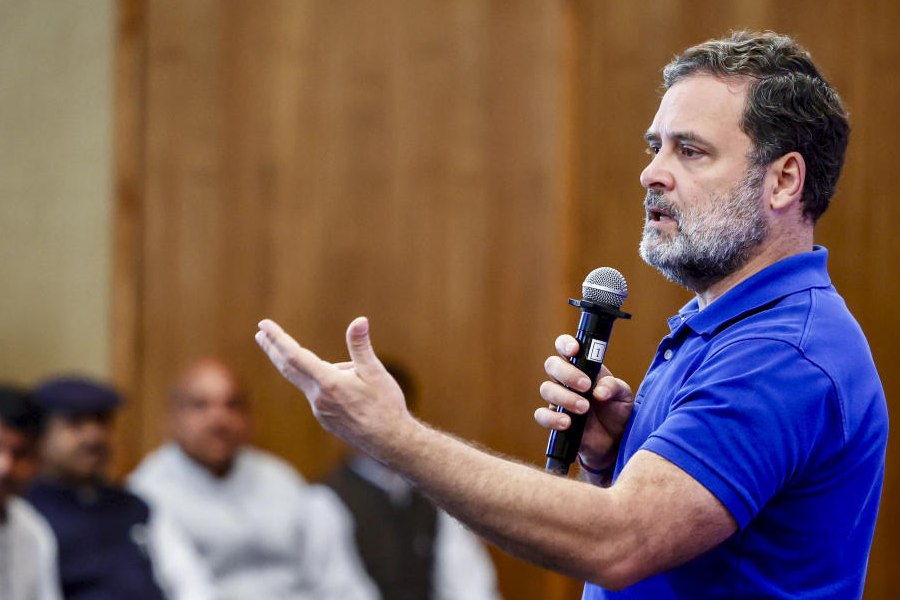|
|
Time and again, the term “globalization” turns up like a computer virus that cannot be shaken off, in the media, in classrooms and academic discussions. With equal ease, it applies to religion, culture, politics, economics, cable television, Indians travelling abroad on package tours and the pilfering of intellectual property. Indeed, the term is attractive because it seems to capture so many different ways, fair or unfair, in which borders dissolve around us.
Underneath the soft pulp of rhetoric, there is often a core of analysis and ideology. Thus, economic globalization has a fairly concrete meaning. It means, on the one hand, a rapid international economic integration driven by an “invisible hand”. On the other hand, it is a political stance that says that India needs globalization for economic growth.
Undoubtedly, a rapid integration is taking place since the Nineties, aided by the trade and investment reforms, the information technology and telecom revolutions, the end of the Soviet trading bloc and international efforts at creating a global trading regime. We see the change in the proportion of trade in national income, or the flow of foreign investments. Both have risen dramatically in India in the last 15 years. Direction and composition of trade have diversified. For example, we now trade heavily with east and south-east Asia. Services such as skilled labour or information itself have never been tradable to the extent we see in India today. What implications does this have for growth and welfare?
The answer to this question is caught up in ideology. Three general positions can be recognized. A sustained pro-market campaign by the World Bank and by economists like Jagadish Bhagwati and T.N. Srinivasan argues that globalization would not only generate higher growth and efficiency, but also improve mass well-being. It will improve welfare, among other means, by generating returns to resources that are relatively abundant in India, such as skilled and unskilled labour. A second position, identified with Amartya Sen and Jean Drèze, proposes that globalization is necessary but not sufficient to make a dent in poverty and deprivation. A third position, articulated by what we may broadly call the Jawaharlal Nehru University school, argues that globalization would in fact bring down growth, among other means, via adverse effects of easy import and increasing inequality in aggregate demand.
Debates like this often confuse “globalization” as such with other aspects of policy reform such as bureaucratic deregulation. What I wish to stress here is that, even though economic globalization has accelerated in recent times, the ideological debate echoes some fairly old uncertainties within economics.
The perennial element in the globalization debate is a battle over the agency of the market in the development process. It is a battle between those who believe that market transactions need to be relatively free (and global) to attain economic growth, and those who believe that markets have a tendency to fail, or to generate more inequality than growth.
From the 19th century, mainstream Western political economics has advocated “free trade”. And equally, the advocacy of free trade has provoked sharp reaction, especially in the third world. India, indeed, was a major stage where such battles were fought. In the Thirties, an Indian concept of development, consciously different from the Western one based on trade and industrialization, emerged. There were many schools within this broad current of economic nationalism. But all these traditions had a common core: an emphatic rejection of Western economics’ faith in trade as an engine of growth.
Consequently, they tended to place a heavy accent on the state, and invariably brought morality and ethics into visions of progress as a counterpoint to the “economic man” of the Western growth models. The Gandhians’ call for self-reliant village communities and the need to have ethics at the heart of economics, symbolized the reaction against a market-based development model. Gandhi’s notion of “trusteeship”, for example, was a qualification on private property right. The socialists’ demand for Central planning and a commanding public sector symbolized a reaction against a market-led development model. And a general opposition to foreign investment again signified a rejection of the faith in (global) market transactions as an instrument in development.
At this time, capitalism was in crisis worldwide, from the Great Depression at one end and reports of Soviet achievements at another. The crisis was not lost on Western liberal economics. But liberal economics did not reject the market, rather re-affirmed its role while simultaneously advocating collective institutions to deal with market failure. Indeed, the very inventor, as it were, of market-failure, John Keynes, in his 1926 lecture, “The End of Laissez-faire”, affirmed a qualified optimism about market as an instrument for growth and welfare. The more moderate critiques of the globalization ideology among today’s economists, such as Joseph Stiglitz, are Keynesians in this sense.
But, in the prevailing political mood in India in the Forties, this qualified market-optimism had few takers, and nationalist thought won the day.
Forty years later, the market-pessimist development model fostered by these sentiments was widely seen as a failure, for having weakened market incentives while spawning a not-too-efficient state sector. But alongside this new change of mindset, inevitably the anti-market sentiment has been consolidating too.
What is noteworthy is that the language of the current debate on economic globalization echoes time-worn qualms about market-driven growth. Qualms over three types of problems in particular: market-failure, risk and equity. In a nutshell, the anti-globalization case is that re-entry in a world market imposes three types of stress for India. It means exposure to monopolistic markets dominated by multinational corporations. Trade-driven specialization increases risks. And trade in subsistence goods like food compromises food security for the poor. These arguments have been around for a long time, and the world has not seen a clear resolution thereof. Why? Because in each case, the reality is that freer trade makes one face, not a uniform increase in power, risk, or inequity, but a trade-off, significant gains in income and welfare against some costs.
Let me illustrate this contradictory picture with some examples from post-reform India. Anti-globalizers claim that India’s trade reforms benefited a tiny elite. A pro-globalizer can easily show this to be wrong. The most important example of an export commodity that benefited from trade reforms is textiles and garments. In the last 15 years, an estimated one million jobs were created in this sector, almost wholly driven by the export boom. And yet, this very orientation to the foreign market hurt the textile industry terribly in the late-Nineties recession, when the export market crashed. The increased exposure to risks strengthens the anti-globalization case.
In agriculture recently, MNCs have entered the seeds market. Anti-globalizers say that monopoly in the market for agricultural inputs distorts potential benefits from global trade links. Pro-globalizers respond that these inputs significantly add to peasant incomes, and that there is room for doubt whether the global seeds markets are in fact monopolistic or contestable. Again as in the case of textiles, an anti-globalizer would say that these markets bring in market risks, evident in recent cases of over-specialization in cotton in parts of Andhra Pradesh. A pro-globalizer would respond, let us then have better insurance systems, but not return to a closed economy.
To cut a long story short, the ideological debate over economic globalization restates an eternal dispute at the heart of economics. The dispute concerns the three dangers from market exchange; market-failure, risks, and equity. In the current debate, the stake is not just what is happening in India in the last two, three, four or ten years. The stake is, what position we espouse on the agency of the market in the development process: optimism, pessimism or qualified optimism.











